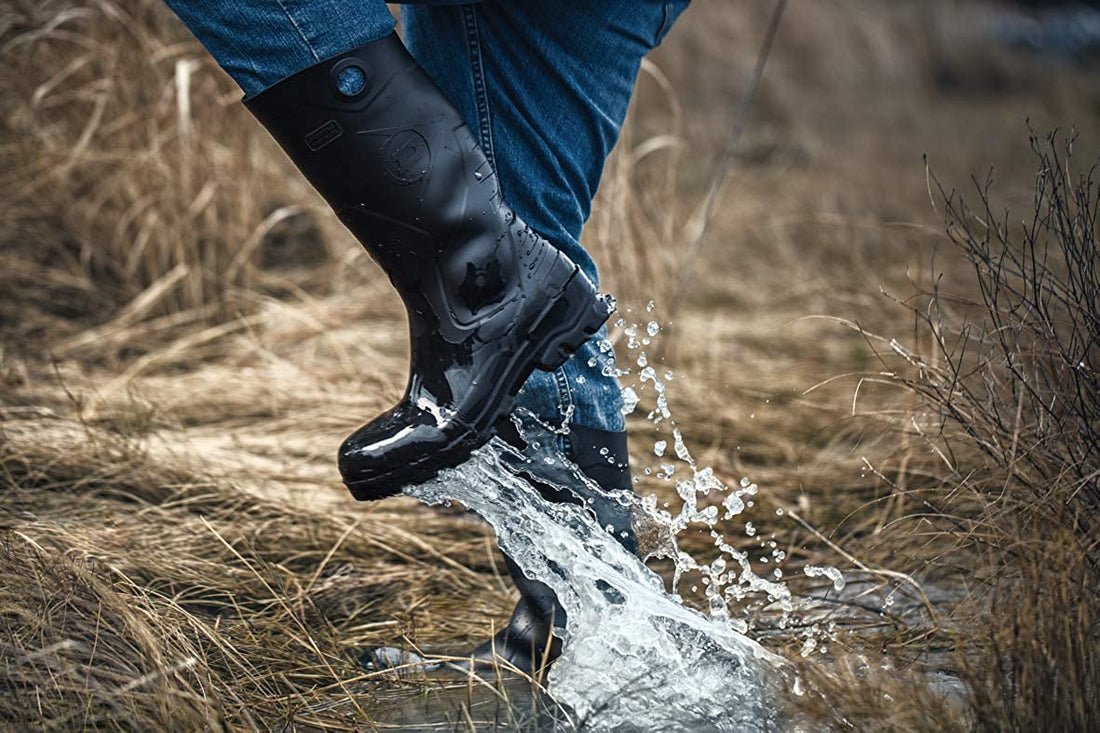Rubber boots - this type of boots is usually used in damp, wet or chemically aggressive environments.At the same time, selected models with inner lining can be used in cold environments.There are models of rubber footwear with an insulated sole, designed for work at extremely low temperatures.You can also find models of rubber boots for use on individual farms.
You can view the range of rubber shoes - HERE

Not all leather boots are meant for dirty work.Some jobs that are exposed to certain types of chemicals or certain types of terrain require special rubber boots with specific properties to protect the workers.
And while rubber boots are extremely useful for dirty jobs, PVC boots are starting to gain popularity among those looking for an alternative.What are PVC work boots?
PVC work boots are made of polyvinyl chloride, a plastic polymer, and molded by injection molding.This makes the shoes very waterproof and light.
It is very important to make sure that your work shoes are designed to suit your work environment.In this article, let's discuss some of the pros and cons of PVC shoes.
Advantages of PVC shoes
Here are some of the main reasons why you should choose PVC footwear:
Inexpensive - PVC is a synthetic material and costs much less than other work shoes made of rubber.Many rubber boots are high-end, so if you're just starting a new job, PVC might make more sense.
Lightweight - The plastic used to make PVC is lighter than traditional rubber, so many workers who need to walk a lot often choose PVC because it puts less stress on the body.
Waterproof - Many rain boots are also made from PVC as the material is 100% waterproof and the molding means there are no seams to let moisture through.If your work is outdoors where you may be exposed to high levels of moisture, PVC would make more sense.
Chemical Protection - The protection offered by PVC boots can vary by type, but in general PVC boots are often used for dirty jobs that may require some chemical protection.
Disadvantages of PVC work boots
Below is a list of reasons why you might want to reconsider purchasing PVC shoes if you have a choice.
Doesn't last as long - Although PVC shoes can get enough use, the long term durability cannot be compared to rubber shoes.If you want to invest in a pair that will last you years, rubber is the way to go.
Non-biodegradable - Since PVC is a completely synthetic material, it will last longer in landfills and is more difficult to break down.Since rubber is 100% natural, it is much more environmentally friendly.
Not as flexible - rubber boots can be more flexible and move with the foot as you move.However, this is not the case with PVC due to its stiffness, so rubber is usually a more comfortable choice.In cold environments, PVC boots can be quite stiff.

What type of work are PVC boots used for?
PVC boots are quite common in jobs that are exposed to wet terrain and/or jobs that use chemicals, fertilizers, or other potentially hazardous materials.Of course, PVC boots don't necessarily protect you from all hazardous materials, and you'll always want to make sure that PVC boots are right for your job.
PVC shoes are quite common:
- Farming and Agriculture
- Poultry and food processing
- Oil platforms
- Fisheries and Wildlife
Constantly working in a wet environment, PVC boots can also be used, even if they are not on the job list posted above.PVC shoes can make sense even for routine tasks such as painting the house, washing the car, planting trees, and other routine tasks.
PVC shoes can last longer than you think
Yes, PVC shoes generally won't last as long as rubber shoes, but there are some things you can do to improve the life of your shoes.Here are some suggestions:
Only wear them for work - Have separate pairs of shoes when you're not working so you don't have to wear the same work shoes every day for every activity.This will keep them much fresher and fitter when it comes time to do some tough custom work.
Clean regularly - Accumulated dirt and grime will damage your shoes faster.Be sure to take a washcloth and clean your shoes once a week to keep them clean and free of dirt and chemicals.
Proper Storage - When you get home after a long and hard day at work, be sure to store your shoes properly.Don't keep them in the same work bag all day, because the moisture will cause bacteria and fungus to grow in them.
Spray Them - If you work in security, for example, and your PVC boots are exposed to household cleaners, a quick water rinse will help wash away the chemicals and protect the boots.
Following these simple steps will keep your PVC shoes looking fresh and new for many months to come - as a bonus, you'll save money by taking care of them properly and extending their life.

